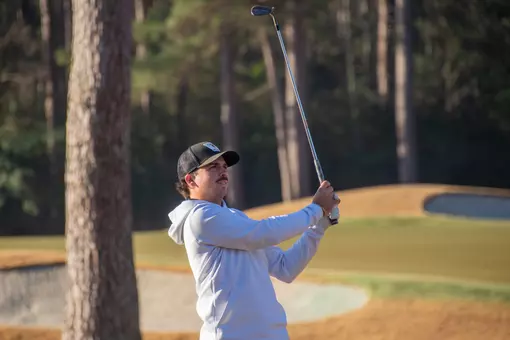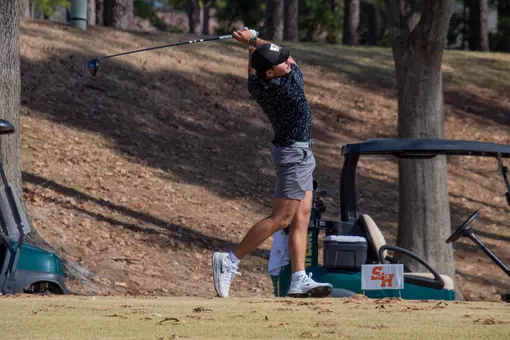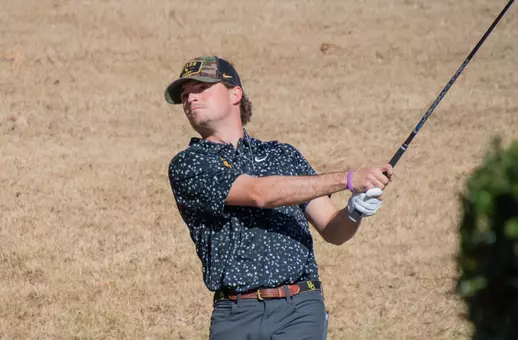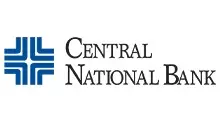Inside the PGA Tour: What Not to Do
10/31/2002 12:00:00 AM | Men's Golf
Oct. 31, 2002
Each month, former Baylor golfer and current PGA professional Jerry Smith writes a column for the official Baylor athletic web site describing various aspects of the PGA Tour. For past columns, please browse our archives.
The PGA golf season is quickly coming to a close and I thought it would be a good idea to write about my season that has gone awry, the mistakes that were made and what lies ahead.
I though this article would be a totally different scenario - one accounting for my first Tour victory, the continual climb up the ladder of golf performance and the feeling as a mainstay on the PGA Tour through my senior years. It has been several weeks since my last article, a period that includes six straight missed cuts and falling outside the Top 150 on the Money List. Frankly, I have not been able to find many words to put on paper.
This has not been a season to write about a lot of successful experiences, but rather to reflect and offer some advice of what not to do. The PGA Tour is a highly competitive atmosphere and can be very fragile if taken for granted. As in all professional sports today, the potential financial fortunes are beyond belief. With increased purses, a new TV contract and the making of a Tiger, it is going to take in the neighborhood of $525,000 this year to keep your Tour card. This amount could be a cool million dollars five years from now.
As a pro, the trap you do not want to fall into is increasing your spending too rapidly so that if you are was forced to take a step back for a year or two (e.g. losing your card and playing on the Nationwide Tour, foreign tours or mini tours) that it would not cause a major strain on your home life and family. To play your best golf you must be able to do so free of outside interferences allowing your mind and body to respond to the task at hand.
There are numerous keys to prolonged success in business including delegation of duties, management skills, trust of your employees and short and long term planning. Though professional golf is an individual profession, you must have a team of people around you looking out for your best interests and assisting with all the time constraints that follow from being on the PGA Tour. I personally have tried to do more than I can handle on my own which has made it hard to establish a consistent routine this year. Without that routine, it is easy to fall into bad habits which lead to changes and then to searching when things go astray.
Searching, or lack of focus, is the kiss of death on Tour. You will have instructors, club manufacturers, sports psychologists, other players, family and friends wanting to offer their advice on why you are not playing well. Picture the scene of Kevin Costner hitting shanks on the practice tee at the U.S. Open in the movie Tin Cup. His caddie, Cheech Marin, has him turn his hat backwards, tie his shoe in a knot, move his pocket's contents from one to the other, walk around the ball on the ground and then step up and hit it. He strikes it perfectly as everyone is watching very peculiarly. When asked what he did, Cheech responds, "You weren't thinking." Then the two go off and by the end of the week come to the final hole of a major championship with a chance to win.
It is extremely important to know your game and what works best for you. You must find a swing coach, an agent you can trust with your scheduling which includes not only tournament pro-ams, charity outings and contract negotiations, a mental coach, a fitness instructor, a caddy, an equipment company or companies that you know work, and, most important of all, a spouse and home life that is solid as a rock. Though some players will have additional members of their team and some fewer, it is vital to find out what works best for you and stick with it.
I think it is also very important to have mentors both in golf and others outside of golf to whom you can turn for advice. All successful people have such counselors who have influenced their life in a way that helped shape them in the person they are.
A final aspect I would like to address is outside interests. Always listed in player profiles are their hobbies which often include fishing, hunting, flying, racing, boating, investing, reading, other sports and, of course, family activities. You must balance your personal and professional lives. It is very easy when one is trying to climb the ladder of success to lose sight of what brings him/her pleasure. The top players establish a 25-28 event schedule, space out tournaments to play 2-5 events in a row, take timely vacations with their family and stay in tune with those hobbies that are of interest and often times create new ones.
The past three years I have played a hefty schedule, averaging 32 events and concentrating on improving myself physically in the off-season. That hasn't left much time for me to enjoy myself and my family to the degree that I should. I have actually, for the first time since 1989, felt periods of burnout this season.
With that, I sit here and look to what lies ahead. My wife and I are soon expecting our second child, another adopted daughter. We are simply thrilled and cannot say enough for the adoption process and the agency, Chicks-in-Crisis, with which we have dealt. One tournament, the Southern Farm Bureau Classic, does remain on the schedule.
Next will be a return trip to Q-School, barring a win or second place showing in Mississippi. I am already exempt from the first of the three stages of Q-School and will be exempt from the second stage if I finish in the Top 150. If not, I'm off to Monterrey, CA the week after Mississippi to vie for one of the 20 spots out of 78 competitors to advance to the finals. The finals this year are being contested in Palm Springs, CA where 168 players compete for 35 spots over six rounds.
I embrace the challenges ahead and no matter what tour I find myself competing on next year, I can truly say 2002 was a learning experience and one I'm confident will lead to the successes that are about to follow.
Sic 'em Bears,




















